Navigating Parenting Challenges with Online Counselling
By Prapoorna M
Last Updated: November 27, 2021
Understanding the Journey of Parenting in Today’s World
Parenting is a journey filled with love, challenges, and learning. It’s about guiding, nurturing, and supporting your children as they grow and discover the world. However, this journey isn’t always straightforward. The complexities of modern life have added new layers to the age-old role of parenting. Balancing work, personal commitments, and raising children can be overwhelming, making the path of parenthood one that is often rocky and unpredictable.
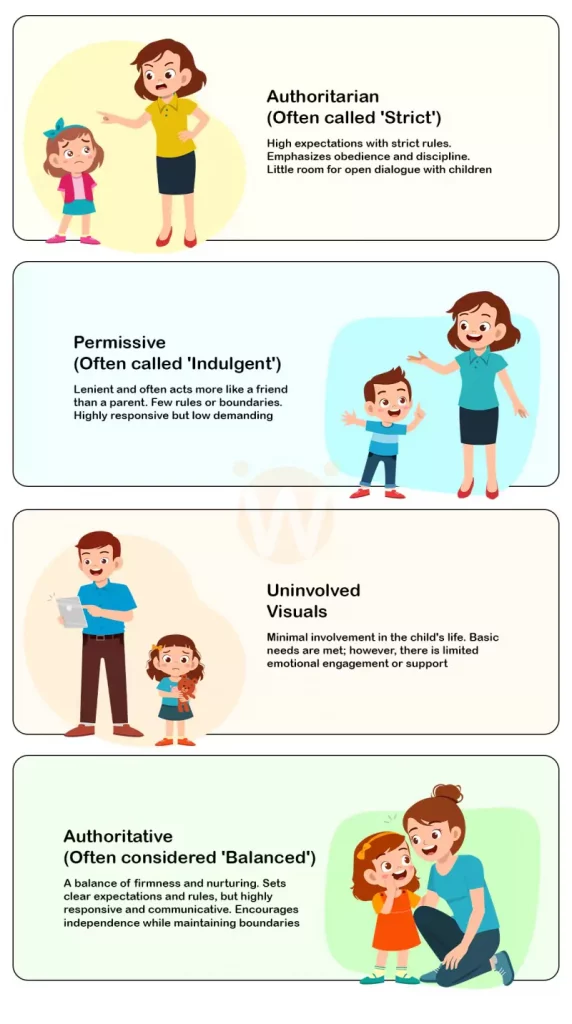
In recent years, online therapy has emerged as a beacon of support for parents navigating these waters. It offers a helping hand in understanding and managing the challenges that come with raising children in today’s fast-paced world. Whether it’s dealing with behavioral issues, understanding developmental stages, or simply seeking guidance on effective communication, online therapy provides an accessible and flexible solution for parents everywhere.
Traditional vs. Online Counseling Comparison
| Aspect | Traditional Counseling | Online Counseling |
|---|---|---|
| Cost | Often higher due to office overheads. | Generally more affordable. |
| Convenience | Requires traveling to a counselor’s office. | Accessible from anywhere with an internet connection. |
| Privacy | Privacy within the office, but public visibility entering/exiting. | Private sessions from the comfort of home, offering more anonymity. |
| Range of Services | Dependent on local professionals available. | Access to a wide range of specialists regardless of location. |
| Flexibility | Fixed schedule based on office hours. | Flexible scheduling, including evenings and weekends. |
| Comfort | Familiar office setting. | Comfort of a familiar personal space. |
| Technology Needs | None beyond basic communication. | Requires a reliable internet connection and a device (computer, tablet, phone). |
| Emergency Support | Direct intervention possible in crisis. | May need additional local support for immediate crises. |
| Personal Connection | Face-to-face interaction. | Virtual interaction, which may affect the personal connection for some. |
The Reality of Modern Parenting: Navigating the Fast-Paced World
The world we live in today moves at a breakneck speed. This rapid pace has significantly impacted parenting. Juggling the demands of work, managing household responsibilities, and ensuring the well-being of children can leave parents feeling stretched thin. Time, or the lack thereof, becomes a precious commodity, often leading to stress and anxiety.
Common struggles such as managing schedules, ensuring quality family time, and maintaining a healthy work-life balance are realities for most parents. The challenge is not just about providing for the physical needs of children but also attending to their emotional and psychological growth. In this balancing act, parents often find themselves searching for ways to do it all without compromising the quality of their parenting or their personal well-being.
In such a scenario, finding support and guidance can make a significant difference. Online therapy steps in as a practical solution, offering parents the tools and insights they need to navigate the complexities of modern parenting. It’s about finding that equilibrium where parents can meet their responsibilities while fostering a loving and nurturing environment for their children to thrive.
The Benefits of Online Parenting Counselling: Flexible, Accessible, and Private
Online parenting counseling is like having a personal guide at your fingertips. One of its greatest strengths is flexibility. Parents can access support and advice at times that suit their busy schedules, whether it’s during a child’s naptime, in the evening, or even in the early hours of the morning. This flexibility means that help is available whenever it’s most needed, breaking the barriers of traditional office hours.
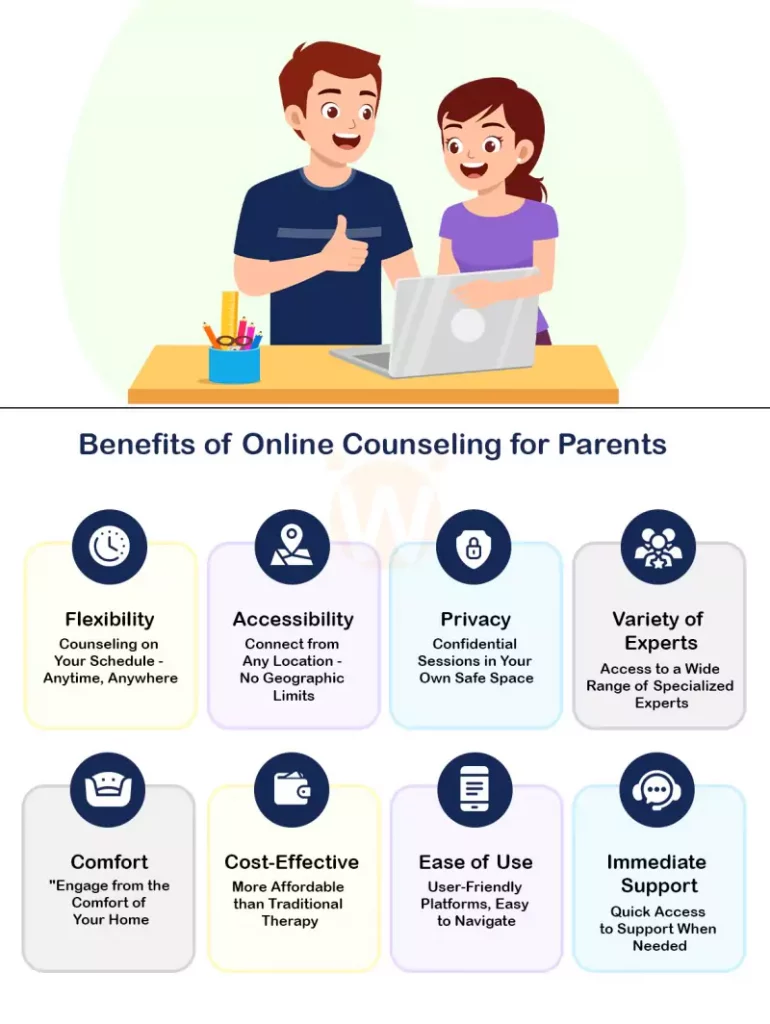
Accessibility is another key advantage. No matter where you live, whether in a bustling city or a remote rural area, online counseling brings expert advice to your doorstep. It erases geographical limits, connecting you with specialists from across the country, or even internationally, who might otherwise be out of reach.
Privacy and convenience are also major benefits. Engaging in counseling from the comfort of your own home provides a sense of security and confidentiality. It also eliminates the need for travel, saving time and reducing the stress of fitting another appointment into an already packed schedule.
Moreover, online counseling offers a diverse pool of experts. Parents can choose a counselor who best matches their family’s needs and preferences, whether it’s someone with expertise in specific parenting challenges, child development stages, or cultural understanding.
Understanding Different Parenting Styles: A Key to Harmonious Family Life
Parenting styles are as diverse as families themselves. Generally, they fall into four main categories:
- Authoritarian: This style is defined by strict rules and high expectations, with little room for open dialogue. Parents who lean towards this style often believe in ‘because I said so’ as a rationale.
- Permissive: Permissive parents are lenient. They often serve more as a friend than a traditional parent figure, allowing children a lot of freedom and stepping back from enforcing rules.
- Uninvolved: In this style, parents are detached from their child’s life. They provide basic needs but are generally uninvolved in their child’s day-to-day activities and emotional development.
- Authoritative: This style is a balance of firmness and nurturing. Authoritative parents set clear rules and high expectations, but they also encourage independence and are responsive to their children’s needs.
Understanding your parenting style is crucial, as it directly influences your child’s behavior and development. Online counseling can play a vital role in helping parents identify their inherent style. Counselors work with parents to understand the impact of their methods and help them adapt their approach to suit their child’s unique personality and needs.
A counselor can provide insights and techniques to modify or enhance parenting strategies. This might mean adopting more effective communication methods, understanding the emotional needs of the child, or learning how to set and enforce boundaries in a way that supports healthy development. The goal is always to create a harmonious family environment where children feel valued, understood, and guided towards positive growth.
Building a Strong Parent-Child Relationship: Communication and Understanding
Building a strong and healthy relationship with your child is the cornerstone of effective parenting. The foundation of this relationship is open communication and understanding. Here are some tips to foster this:
- Active Listening: Listen to your child without interrupting. Show that you are genuinely interested in what they have to say. This helps them feel valued and understood.
- Encourage Expression: Encourage your child to express their feelings and thoughts. Let them know it’s okay to share their emotions, whether they’re happy, sad, frustrated, or excited.
- Use Age-Appropriate Language: Communicate in a way that your child can understand. Adjust your language and explanations according to their age and level of understanding.
- Be Honest and Open: While it’s important to keep conversations age-appropriate, honesty is key. If they ask tough questions, give truthful answers that they can comprehend.
- Resolve Conflicts Peacefully: When disagreements arise, approach them calmly. Use it as an opportunity to teach problem-solving skills. Encourage your child to express their viewpoint and offer solutions.
- Regular Check-ins: Have regular conversations about daily activities and feelings. This doesn’t have to be a formal process – it can happen during dinner, bedtime, or while doing chores together.
Dealing with Specific Challenges: Behavioral Issues, Sibling Rivalry, and Special Needs

Parenting is not without its challenges. Here are ways to address some common ones:
- Behavioral Problems: Set clear and consistent rules. Understand the reason behind the behavior. Is it attention-seeking, or is there an underlying issue? Use positive reinforcement for good behavior and be consistent with consequences for inappropriate behavior.
- Sibling Rivalry: Ensure each child feels equally loved and valued. Avoid comparisons and encourage cooperative activities that foster teamwork rather than competition. Be fair and impartial when resolving disputes.
- Managing Expectations: Be realistic about what to expect from your child at different stages of their development. Celebrate their achievements, no matter how small, and provide encouragement rather than criticism.
- Parenting Children with Special Needs (such as ASD or Dyslexia):
- Understand Their World: Learn as much as you can about their condition. This understanding will guide your approach to their needs.
- Establish Routine: Children with ASD, for example, often thrive on routine. A predictable environment can help reduce anxiety and behavioral issues.
- Seek Support: Don’t hesitate to reach out to specialists who can provide tailored strategies for your child’s unique needs.
- Celebrate Their Strengths: Focus on their abilities, not just their challenges. Celebrate their successes and unique talents.
- Practice Patience: Progress may be slow, and there will be challenging days. Patience and perseverance are key.
Common Parenting Challenges and Solutions through Online Counseling
| Parenting Challenge | Description of Challenge | How Online Counseling Can Help |
|---|---|---|
| Behavioral Issues | Children displaying disobedience, aggression, or other problematic behaviors. | Offers strategies for behavior management, positive reinforcement techniques, and understanding underlying causes. |
| Sibling Rivalry | Conflicts and competition between siblings. | Teaches conflict resolution skills, promotes fair parenting practices, and helps in fostering cooperative family dynamics. |
| Balancing Work and Parenting | Struggling to manage work responsibilities and parenting duties effectively. | Provides time management strategies, stress reduction techniques, and ways to create quality family time. |
| Parental Stress and Burnout | High levels of stress experienced by parents, leading to exhaustion. | Focuses on self-care practices, offers coping mechanisms for stress, and encourages setting realistic parenting goals. |
| Communication Barriers | Difficulty in understanding or connecting with children. | Enhances communication skills, teaches active listening techniques, and helps in building emotional intelligence. |
| Discipline and Setting Boundaries | Challenges in implementing effective discipline and boundaries. | Guides on age-appropriate discipline methods, consistency in rules, and balancing firmness with love. |
| Parenting Special Needs Children | Navigating the unique challenges of raising children with special needs (e.g., ASD, ADHD). | Specialized advice for dealing with specific conditions, tailored behavior management strategies, and emotional support for parents. |
| Managing Expectations | Dealing with personal or societal expectations about parenting. | Helps in setting realistic expectations, fostering a positive self-image as a parent, and managing external pressures. |
| Impact of Family Dynamics | Influence of marital issues, extended family, or financial stress on parenting. | Offers strategies to manage these external influences, improve family relationships, and create a supportive home environment. |
In all these challenges, remember that every child is unique, and what works for one may not work for another. The goal is to understand and adapt to your child’s individual needs, fostering a loving and supportive environment that allows them to thrive.
Support for Parents’ Well-being: Mental Health and Self-Care
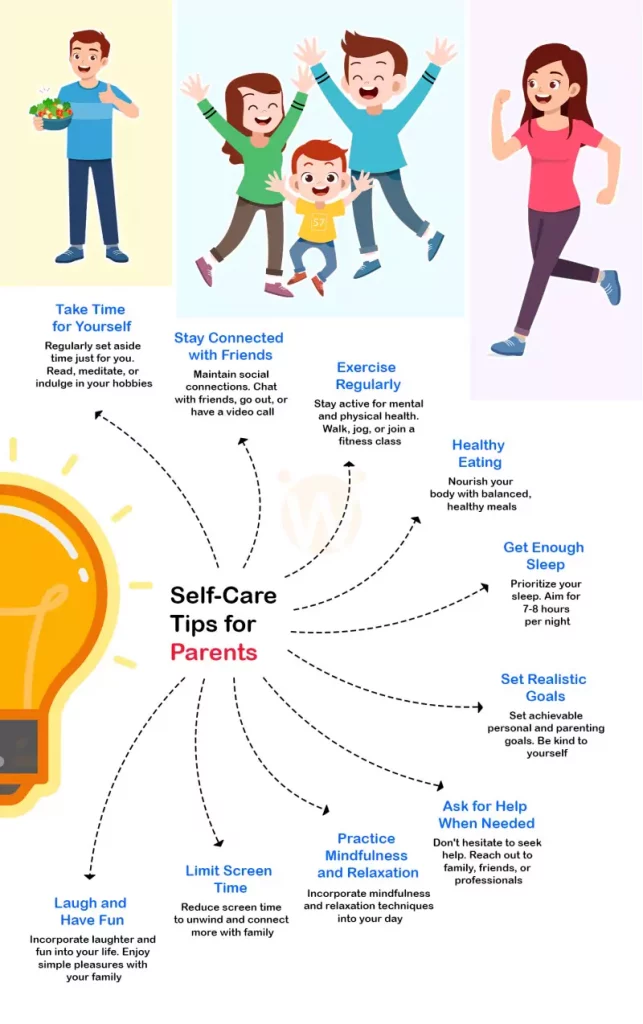
Parenting is not just about caring for your children; it’s equally about taking care of yourself. Your mental health and well-being are crucial in creating a positive family environment. Here’s why and how you can maintain it:
- Recognizing the Importance of Mental Health: Just like physical health, mental health is vital. It affects how you think, feel, and act as a parent. Stress, anxiety, and depression can impact your parenting style and, in turn, affect your child’s well-being.
- Self-Care is Essential: Taking time for yourself isn’t selfish; it’s necessary. Engage in activities that relax and rejuvenate you. It could be as simple as reading, exercising, or spending time with friends.
- Seeking Counseling for Support: Counseling can be a powerful tool in managing parental stress, guilt, and burnout. A counselor can provide strategies to cope with the pressures of parenting and help you find balance.
- Creating a Support Network: Surround yourself with people who understand and support you. This network could include family, friends, or parenting groups.
- Setting Realistic Expectations: Understand that it’s okay not to be perfect. Parenting is a learning process, and it’s alright to make mistakes and learn from them.
Customizing Parenting Techniques: Positive Methods for a Positive Home
Every family is unique, and so are the ways they interact and manage their day-to-day life. Here are some ideas on customizing your parenting techniques:
- Positive Reinforcement: Recognize and praise your child’s good behavior and achievements. This reinforces the behavior you want to see and boosts their self-esteem.
- Setting Boundaries with Love: Clear boundaries are essential for children. They provide a sense of security and help them understand expectations. Combine these boundaries with love and understanding.
- Discipline with Empathy: Discipline is about teaching, not punishing. Approach disciplinary moments with empathy, aiming to help your child understand the consequences of their actions and learn from them.
- Consistency is Key: Be consistent in your rules and the way you apply them. Consistency helps children understand what is expected of them and creates a sense of stability.
- Quality Time Matters: Spend quality time with your children. It doesn’t always have to be about doing something special. Even everyday activities like cooking or grocery shopping can be opportunities for bonding.
- Empathy in Action: Try to see the world from your child’s perspective. Understanding their feelings and viewpoints can greatly enhance your relationship and communication.
By incorporating these techniques, you can create a nurturing and positive home environment where your child feels valued and understood, and where you, as a parent, also feel fulfilled and balanced.
The Impact of Family Dynamics on Parenting
Family dynamics play a crucial role in shaping the parenting experience. Various external factors can significantly influence how we parent:
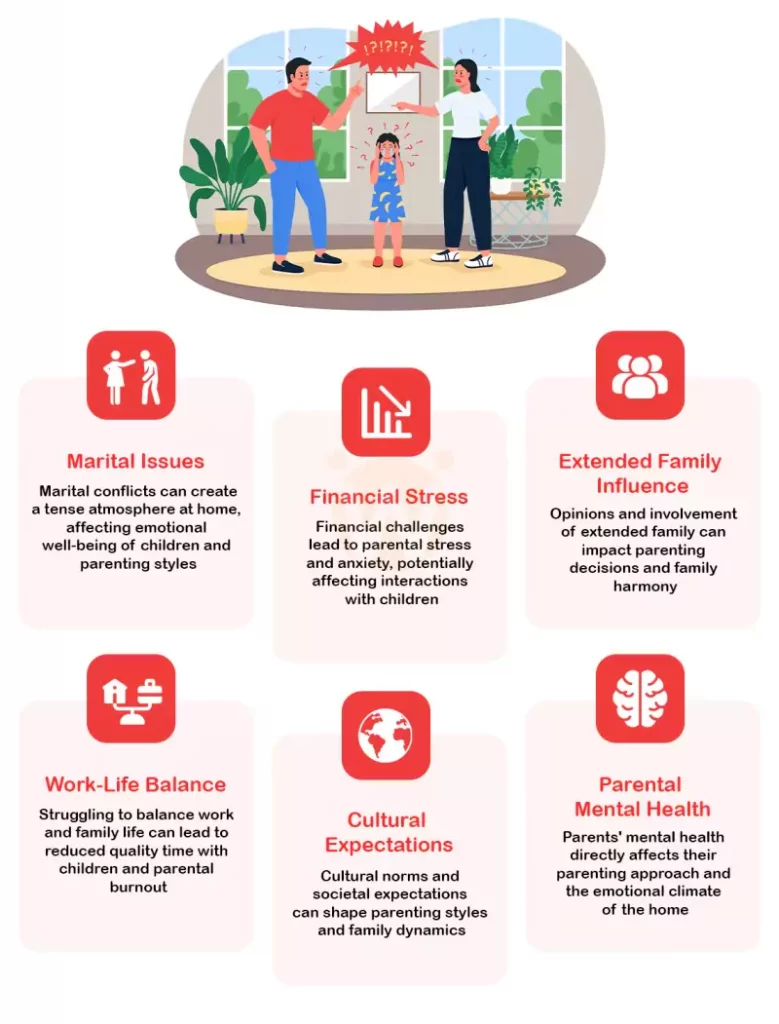
- Marital Issues: Conflict between partners can create a tense home environment, affecting both the parents’ mental well-being and the emotional health of the children. It’s important to address these issues, not only for the sake of the marital relationship but also for the overall harmony of the family.
- Financial Stress: Financial difficulties are a common source of stress in many families. This stress can spill over into parenting, sometimes leading to impatience, anxiety, and decreased quality family time.
- Extended Family Influences: Extended family members, like grandparents, uncles, and aunts, can have a significant impact on parenting styles and decisions. While they can be a source of support, they can also introduce challenges, especially if their views on parenting differ significantly from yours.
- Navigating Through Counseling: Counseling can provide valuable strategies for dealing with these external pressures. It helps parents understand how these factors influence their parenting and offers practical ways to manage their impact. Counselors can also assist in improving communication between family members, which is key to resolving conflicts and reducing stress.
Choosing the Right Online Counseling Service
Finding the right online counseling service is essential for effective support. Here are some factors to consider:
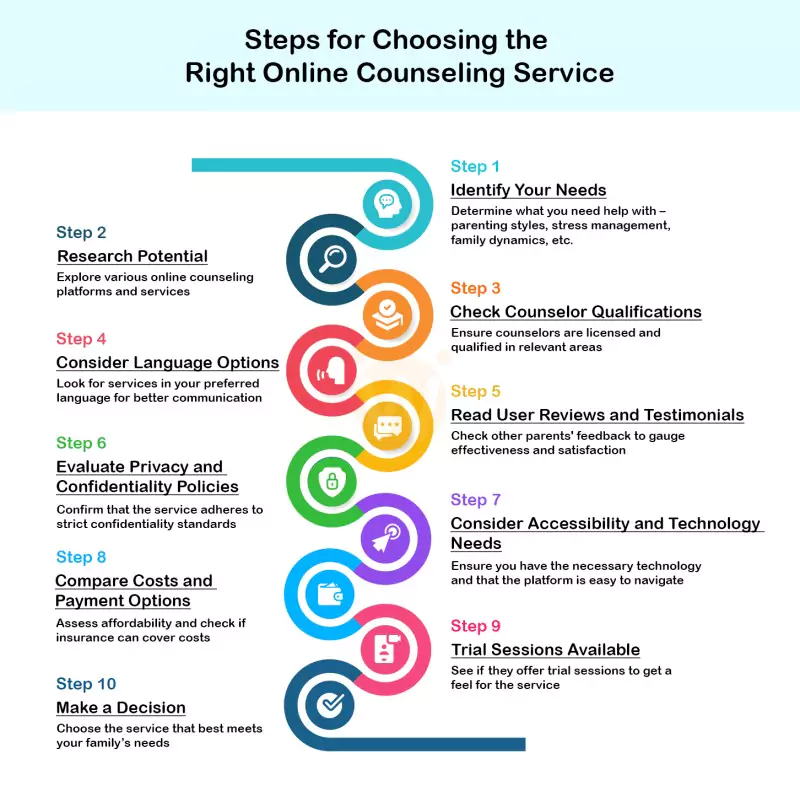
- Counselor Qualifications: Look for services that employ qualified and experienced counselors. Their expertise in specific areas, such as child psychology, family therapy, or stress management, can be particularly beneficial.
- Language Options: If English isn’t your first language, or if you’re more comfortable in another language, check if the service offers counseling in different languages.
- User Reviews and Testimonials: User reviews can provide insight into the effectiveness of the counseling service and the satisfaction of other clients.
- Accessibility and Convenience: Consider how the counseling sessions are conducted (via video call, phone call, chat, etc.) and whether the service’s hours suit your schedule.
- Privacy and Confidentiality: Ensure that the platform adheres to strict confidentiality policies to protect your privacy.
- Cost and Insurance: Check the cost of the services and whether they are covered by your health insurance. Some platforms may offer sliding scale fees based on income.
- Therapeutic Approaches: Different counselors use different therapeutic approaches. Look for a service that offers a variety of approaches to suit your specific needs.
- Trial Sessions: Some services offer a free trial session. This can be a good way to gauge if the counselor and the platform are the right fit for you.
Choosing the right online counseling service is a personal decision. It’s important to find a platform and a counselor with whom you feel comfortable and whose approach aligns with your family’s needs.
Conclusion: Harnessing Online Counseling for Enhanced Parenting
In summary, online counseling emerges as a transformative tool in the parenting landscape. It offers guidance, support, and strategies to navigate the intricacies of modern parenting. As parents seek to balance their responsibilities and foster nurturing environments for their children, online counseling stands as a supportive guide. It’s an invitation to a more effective, fulfilling parenting experience, a journey towards raising happy, healthy children in a loving, supportive environment.
Lastly, when choosing an online counseling service, consider factors such as counselor qualifications, language options, privacy policies, and user reviews to ensure that the service aligns with your family’s needs.
If you find yourself seeking guidance or support in navigating the journey of parenting, consider exploring the services offered by Wellness Hub. Our professional and compassionate counseling can provide you with the tools and support needed for effective parenting. For more information and to take the first step towards a more fulfilling parenting experience, visit Wellness Hub.
In embracing online counseling, you’re not just seeking help; you’re taking a proactive step towards more effective and fulfilling parenting. Whether it’s gaining insights into your parenting style, managing personal stress, or improving family dynamics, online counseling can be an invaluable resource in your parenting journey. Let it be a supportive guide as you navigate the beautiful, yet complex, world of raising children.
Frequently Asked Questions
What is online parenting counselling?
Online parenting counseling is a form of psychological support and guidance provided via the internet. It helps parents deal with various challenges of parenting through communication methods like video calls, chats, and emails.
How can online counseling help me as a parent?
Online counseling can provide you with strategies to manage stress, improve communication with your children, handle behavioral issues, and balance your personal well-being with the demands of parenting.
Is online parenting counseling as effective as face-to-face sessions?
Yes, many studies have shown that online counseling can be as effective as traditional face-to-face therapy. It offers the advantages of flexibility, accessibility, and often a wider choice of therapists.
What types of parenting issues can be addressed through online counselling?
Online counselling can address a range of parenting issues including discipline strategies, managing sibling rivalry, parenting special needs children, and balancing parenting responsibilities with personal life.
How do I choose the right online counselor for parenting advice?
Look for a counselor with qualifications in child psychology or family therapy. Consider their experience, communication style, and reviews from other clients. It’s important to find someone you feel comfortable with.
Can online counseling provide guidance for parenting children with special needs?
Absolutely. Many online counselors specialize in areas like Autism Spectrum Disorder, ADHD, and learning disabilities like Dyslexia, offering tailored strategies and support.
How can I ensure my privacy during online counseling sessions?
Choose a reputable counseling service that adheres to strict confidentiality and privacy policies. Ensure that the platform uses secure, encrypted communication channels.
Are there any specific technical requirements for online counseling?
You’ll need a reliable internet connection, a device with a camera and microphone (like a smartphone, tablet, or computer), and a private space where you can talk without interruptions.
How can I fit online counseling into my busy parenting schedule?
One of the benefits of online counseling is its flexibility. Many counselors offer sessions outside of traditional office hours, including evenings and weekends, to accommodate busy schedules.
How do I get started with online parenting counseling?
Start by researching online counseling services like Wellness Hub. Look for services that specialize in parenting and family counseling. You can usually sign up and schedule a session directly through their website.
Is online counseling suitable for all parents?
Online counseling can be beneficial for most parents, but it may not be suitable for everyone. If you have severe mental health issues or are in crisis, it’s important to seek immediate, in-person help.
Book your Free Consultation Today
Parent/Caregiver Info:
Client’s Details:
* Error Message








